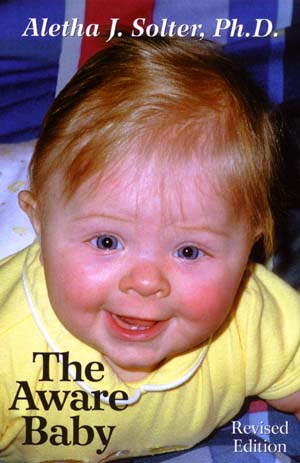Eight-month-old is unable to entertain herself
by Aletha Solter, Ph.D.
Question:
I have an 8-month-old girl. Is it too early to expect her to be able to entertain herself for short periods of time? What is the best way to help her develop this ability, and when is the best time to start? She is a happy girl and loves to laugh and interact. Lately, she gets unhappy if we sit her down or put her in her Exersaucer and put some toys in front of her. Even though we are in the room, she usually won't play by herself. She grumbles and eventually cries until we pick her up. I don't want to force the issue if the time is not right, but I definitely want her to eventually become age-appropriately self-sufficient and independent.
Answer:
Some babies do entertain themselves by eight months of age, while others seem to want more contact with their parents. In general, however, it seems as if babies have a built-in expectation to be a part of adult life and are not prepared, developmentally, to spend large periods of time playing alone. In many traditional cultures, babies are carried in front slings or on their mothers' backs, where they can see everything she is doing. They are never isolated from adult life or left alone to entertain themselves.
Babies are especially demanding between the ages of three months and the onset of crawling. You do not say whether your daughter can crawl. If she can't yet crawl, then she will probably become much less demanding once she is able to move around on her own.
Your daughter could be bored because her toys offer no interesting challenges for her. Be sure that she has the following safe objects to play with: objects of different textures, weights, shapes, sizes, and colors, different kinds of rattles or simple noise makers, containers of various sizes with objects to put in them, stacking and nesting toys, objects with moving parts, and sturdy books. Try to give her one new thing to play with every few days, such as an empty food container or a colorful silk scarf. You can also expose her to different kinds of music and place her on surfaces with different textures. Eight-month-old babies are generally eager for new forms of stimulation. When you are not holding your baby, it is best to put her on the floor so she can move her body freely. This is much better for her physical and cognitive development than being confined in a baby swing or walker.
If your baby wants to be physically close to you, I recommend responding to this need by carrying her close to your body in a baby sling or backpack as much as possible. She might also be content to sit in a high chair near you, for example, while you are working in the kitchen. You can talk to her about what you are doing while she watches you. Or you can let her play with a few safe kitchen objects (such as some pots and pans) on the floor nearby.
Some babies become overly dependent on their parents to entertain them. You can avoid this dependency by being nondirective when you interact with your baby. Don't think of yourself as her entertainer, and don't initiate all the activities. Let your baby take the lead, and be responsive to her, but try to think of yourself more as an observer, listener, and follower. Of course, there are times when you will want to initiate simple games, songs, and other activities with your daughter, but it is important to spend some time each day being less directive with her. You can sit on the floor with her, place some toys nearby, and wait to see what she wants to do. If you continually entertain her and suggest activities, she will learn to expect that kind of interaction, and she might lose the ability to be self-directed and to entertain herself when you are not available.
About Aletha Solter:
Aletha Solter, PhD, is a developmental psychologist, international speaker, consultant, and founder of the Aware Parenting Institute. Her books have been translated into many languages, and she is recognized internationally as an expert on attachment, trauma, and non-punitive discipline.
Aware Parenting is a philosophy of child-rearing that has the potential to change the world. Based on cutting-edge research and insights in child development, Aware Parenting questions most traditional assumptions about raising children, and proposes a new approach that can profoundly shift a parent's relationship with his or her child. Parents who follow this approach raise children who are bright, compassionate, competent, nonviolent, and drug free.
For more information about this topic, see Aletha Solter's book, The Aware Baby.
